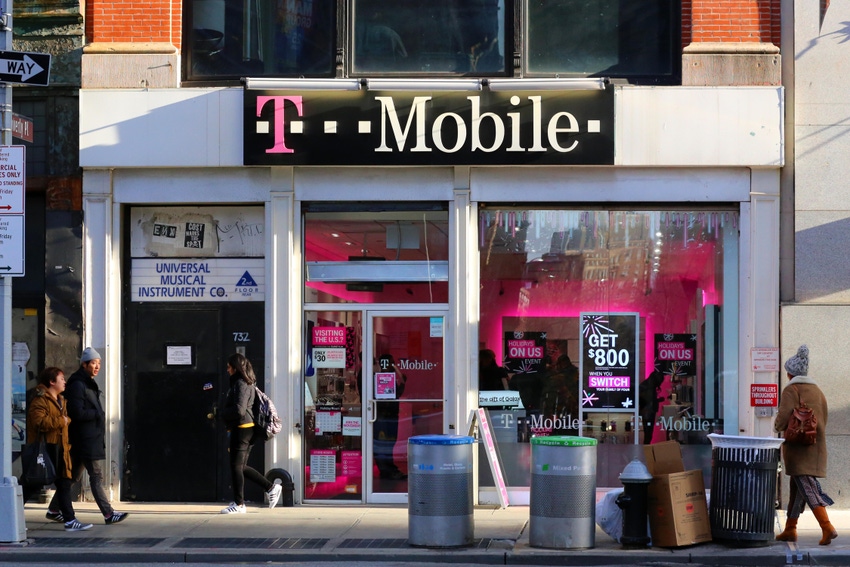Amid FCC fines, T-Mobile expands advertising business
T-Mobile has been growing its ad business for years, but it announced an expansion on the same week the FCC issued roughly $200 million in fines over operators sharing customer location data.

T-Mobile this week announced it would expand its advertising operations into its stores, onto TV screens through a deal with Plex and into its new T Life customer management app.
The company's announcement comes just after the FCC levied fines against T-Mobile totaling $92 million for "illegally sharing access to customers' location information without consent and without taking reasonable measures to protect that information against unauthorized disclosure."
To be clear, the two events are not related. T-Mobile discontinued the sale of its customers' location data in 2019 after news reports raised questions about the practice. The company's new advertising business, meanwhile, primarily involves the sale of data from its customers' app ownership and usage – like how long the app was open and how often it was opened – combined with "knowledge of the individual," according to Jean-Paul Colaco, T-Mobile's new SVP and chief T-Ads officer.
Nonetheless, the developments help highlight the opportunities network operators may have with the data generated from their networks and their operations, as well as the pitfalls they may face as they attempt to profit from that data.
New data for the NewFronts
According to reports from the likes of MediaPost and Broadcasting+Cable, T-Mobile showed off its latest advertising offerings at the NewFronts in New York, a major annual event in the advertising industry.
At the conference, T-Mobile said its new in-store retail media network will allow advertisers to target more than 20,000 screens across 11,000 T-Mobile and Metro by T-Mobile retail locations. T-Mobile said it also plans to expand the operation to other, unnamed retail outlets.
Brands will also be able to advertise through T-Mobile's refreshed customer management and loyalty app, T Life. The app houses account management features as well as various perks and promotions.
Finally, streaming media company Plex said it will host T-Mobile's connected TV ad inventory on its service.
As a result, T-Mobile said its Advertising Solutions business unit now reaches more than 240 million consumers across various screens.
"T-Mobile Advertising Solutions has the unique opportunity to propel the industry forward, delivering more personalized, customer-centric advertising driving higher engagement and superior outcomes for marketers," Colaco explained, according to Broadcasting+Cable.
Colaco has worked at companies including Hulu, Apple and WarnerMedia. He joined T-Mobile roughly ten months ago.
"Our goal in expanding this side of our business is to connect brands with the right customers across relevant screens and measure their campaigns' performance to track brand impact and results," wrote Mike Katz, T-Mobile's marketing chief, in appointing Colaco to his new position.
T-Mobile's new ad business first launched in 2021 under Mike Peralta, and has been expanding since then. Today it includes "exclusive T-Mobile Mobility Data with billions of daily behavioral, environmental, and contextual data signals," and stretches across connected TVs, rideshare ad screens through T-Mobile's acquisition of Octopus Interactive and various digital-out-of-home advertising screens in locations like airports, gas stations and grocery stores.
The fines
The FCC's fine against T-Mobile was part of a broader action the agency took against US wireless network operators. The FCC's fines totaled roughly $200 million across T-Mobile, AT&T and Verizon.
"T-Mobile sold access to its customers' location information to companies known as 'location information aggregators,' who then resold access to such information to third-party location-based service providers or, in some cases, to intermediary companies who then resold access to such information to location-based service providers," the FCC explained in its fine against the operator.
But the fine itself involves some controversy. The FCC proposed the fines in 2020 but agency officials weren't able to approve the action amid partisan deadlock between Republicans and Democrats. Now that the agency has a majority of Democrats, it was able to pass the fines.
"This ugly practice violates the law – specifically Section 222 of the Communications Act, which protects the privacy of consumer data," explained FCC Chairwoman Jessica Rosenworcel, a Democrat, in a statement.
But Brendan Carr, the commission's top Republican, argued that the Federal Trade Commission, not the FCC, is the right entity to take a final enforcement action.
Verizon, AT&T and T-Mobile said this week that they would challenge the FCC's new fines, according to The Wall Street Journal.
About the Author(s)
You May Also Like











